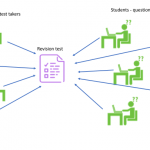 Introducing - Innovative assessments.In this Learning X, we're looking at innovation in assessment. We'll be looking at ideas for staff to use various technologies to support innovative approaches to assessment. For example, if you already get your students to write a reflective piece - how…
Introducing - Innovative assessments.In this Learning X, we're looking at innovation in assessment. We'll be looking at ideas for staff to use various technologies to support innovative approaches to assessment. For example, if you already get your students to write a reflective piece - how… Day 1: Innovation in assessment.This week, we will be looking at innovative approaches to assessment - particularly (though not exclusively) those involving technology. Many staff are already starting to use tools such as Turnitin, Questionmark and My Dundee's assignment tool for online submission / grading, but this week we'll be looking at other tools, both those that we have…
Day 1: Innovation in assessment.This week, we will be looking at innovative approaches to assessment - particularly (though not exclusively) those involving technology. Many staff are already starting to use tools such as Turnitin, Questionmark and My Dundee's assignment tool for online submission / grading, but this week we'll be looking at other tools, both those that we have… Day 2: Students working alone.Yesterday, we asked you to start looking at innovation in assessment - to think about ideas you've read about / have tested yourself. The most common assessment model is one where 1 student creates the work, for a primary audience of 1 (the marker)…
Day 2: Students working alone.Yesterday, we asked you to start looking at innovation in assessment - to think about ideas you've read about / have tested yourself. The most common assessment model is one where 1 student creates the work, for a primary audience of 1 (the marker)… Day 3: Working in groups.Yesterday, we thought about tools that can allow individuals to present their work in varied ways; when we start to think about groups, it becomes the way they communicate between themselves. We're still thinking about the type of model where work is private to the particular group (tomorrow, we'll be starting to think about opening…
Day 3: Working in groups.Yesterday, we thought about tools that can allow individuals to present their work in varied ways; when we start to think about groups, it becomes the way they communicate between themselves. We're still thinking about the type of model where work is private to the particular group (tomorrow, we'll be starting to think about opening… Day 4: Increasing the audience.Over the last 2 days, we've looked at the typical type of assessment, in that the only audience for the work are the marker and the moderator. However, in most workplaces, there's an expectation that a wide range of people will see individuals outputs, whatever they are. In some subjects, this is already done extensively;…
Day 4: Increasing the audience.Over the last 2 days, we've looked at the typical type of assessment, in that the only audience for the work are the marker and the moderator. However, in most workplaces, there's an expectation that a wide range of people will see individuals outputs, whatever they are. In some subjects, this is already done extensively;… Day 5: Involving the students (part 1)Yesterday, we looked at allowing students to see what others have created for their assignment - how about extending this to getting students to set quiz questions for each other - Today, we have a guest post by Dr. Carolina Kuepper-Tetzel. about that. An evidence-based strategy that promotes retention of taught material and fosters understanding…
Day 5: Involving the students (part 1)Yesterday, we looked at allowing students to see what others have created for their assignment - how about extending this to getting students to set quiz questions for each other - Today, we have a guest post by Dr. Carolina Kuepper-Tetzel. about that. An evidence-based strategy that promotes retention of taught material and fosters understanding…- Day 5: Involving the students (part 2)In part 1 of today's post, we thought about encouraging students to develop quiz questions. Yesterday, we looked at allowing students to see what others have created for their assignment - but what about extending this to allow (require!) peer marking, or perhaps getting students to start looking at how they'll be graded. [caption id="attachment_27030"…
Innovative Assessment
Reading Time: < 1 minutes

